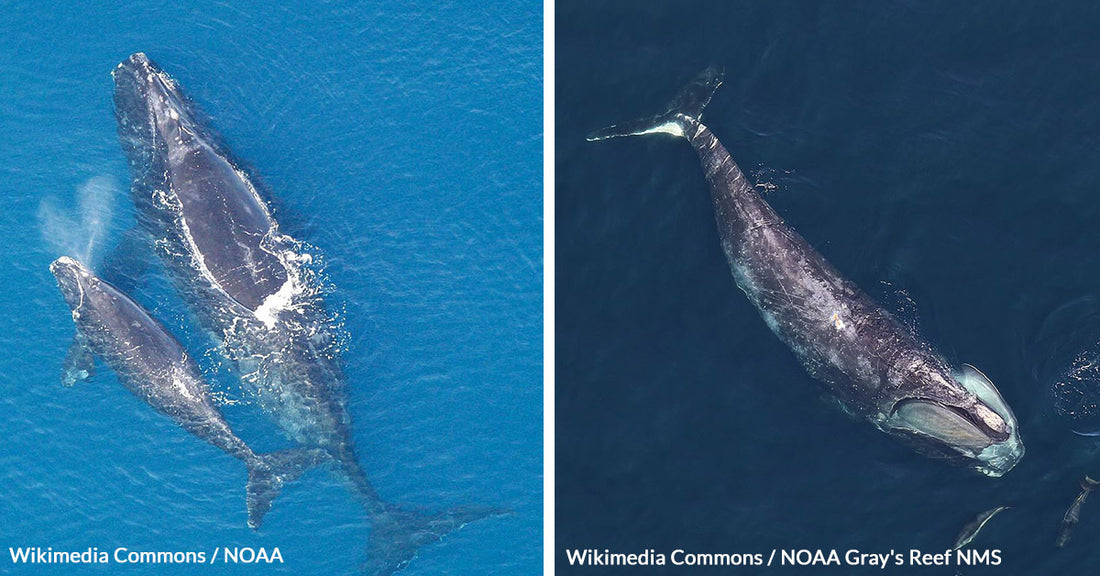Maine Lobster Gear Linked To Fatal Entanglement For Endangered Right Whale
Matthew Russell
Wikimedia Commons / Pcb21 Wikimedia Commons / NOAA Gray's Reef NMS
A critically endangered North Atlantic right whale has been found dead, entangled in fishing gear from a Maine lobster fishery.
This incident is a result of human activity, and a strong argument for sustainable fishing practices.
 Photo: Wikimedia Commons / Pcb21, License: Public Domain
Photo: Wikimedia Commons / Pcb21, License: Public DomainNorth Atlantic right whales are critically endangered, with fewer than 400 individuals remaining.
Identifying the Culprit
The unfortunate demise of right whale #5120, found on Martha's Vineyard, has been directly linked to Maine's lobster industry. The rope, embedded in the whale's tail, bore distinctive purple markings, a requirement for gear identification in Maine watersCape and Islands reports. This connection disrupts the longstanding narrative that Maine's lobster gear had not previously been implicated in right whale entanglements.
 Photo: Wikimedia Commons / NOAA, License: Public Domain
Photo: Wikimedia Commons / NOAA, License: Public DomainEntanglement in fishing gear is one of the leading threats to their survival.
Broader Implications for Marine Conservation
The loss of whale #5120, a young female, is not just a solitary tragedy but a significant blow to the survival of the species. With fewer than 360 North Atlantic right whales remaining, every loss, especially of breeding females, is catastrophic, reports Defenders of Wildlife.
This event highlights the broader issue of marine life entanglements in fishing gear, a leading cause of injury and mortality among whales, USA Today reports.
 Photo: Wikimedia Commons / NOAA Gray's Reef NMS, License: Public Domain
Photo: Wikimedia Commons / NOAA Gray's Reef NMS, License: Public DomainRight whales often suffer severe injuries or death from entanglements.
Response from the Fishing Community
The Maine Lobstermen’s Association expressed sorrow over the incident, emphasizing the rarity of such entanglements and highlighting the industry's efforts to prevent them.
“This is the first reported entanglement of a right whale in Maine lobster gear in 20 years and the first death attributed to the fishery,” the Association said in a statement. “Maine lobstermen have made significant changes to how they fish over the last 25 years to avoid entanglement and continue gear testing.”
Beth Casoni, of the Massachusetts Lobstermen’s Association, explained further context to Cape and Islands.
“Massachusetts has been marking its gear for decades,” she added, “and other states have not. Now we are going to really be able to drill down into where these interactions [and entanglements] are happening so we can mitigate them on a more finite scale.”
Despite these measures, the evidence from whale #5120's entanglement has reignited debates about the impact of lobster fishing on right whales and the effectiveness of current protective measures, reports HuffPost.
 Photo: Wikimedia Commons / Pcb21, License: Public Domain
Photo: Wikimedia Commons / Pcb21, License: Public DomainThe slow swimming speed of right whales makes them more prone to entanglement and ship strike.
The Need for Sustainable Solutions
The incident underscores the urgent need for sustainable fishing practices. Humane alternatives such as on-demand or "ropeless" gear could significantly reduce the risk of entanglements, offering a path towards coexistence between marine conservation and the fishing industry, acording to the Conservation Law Foundation. The development and adoption of such technologies are critical to ensuring the future of both the right whale population and the lobster fishing industry.
A Call to Action
The tragic entanglement of right whale #5120 serves as a stark reminder of the delicate balance between human industry and marine conservation. It calls for immediate action towards more sustainable fishing practices to prevent further loss of these magnificent creatures. The future of the North Atlantic right whale hinges on our ability to harmonize our economic activities with the imperative of environmental stewardship.
Click below and take action for this iconic species!
Matthew Russell is a West Michigan native and with a background in journalism, data analysis, cartography and design thinking. He likes to learn new things and solve old problems whenever possible, and enjoys bicycling, spending time with his daughters, and coffee.




















